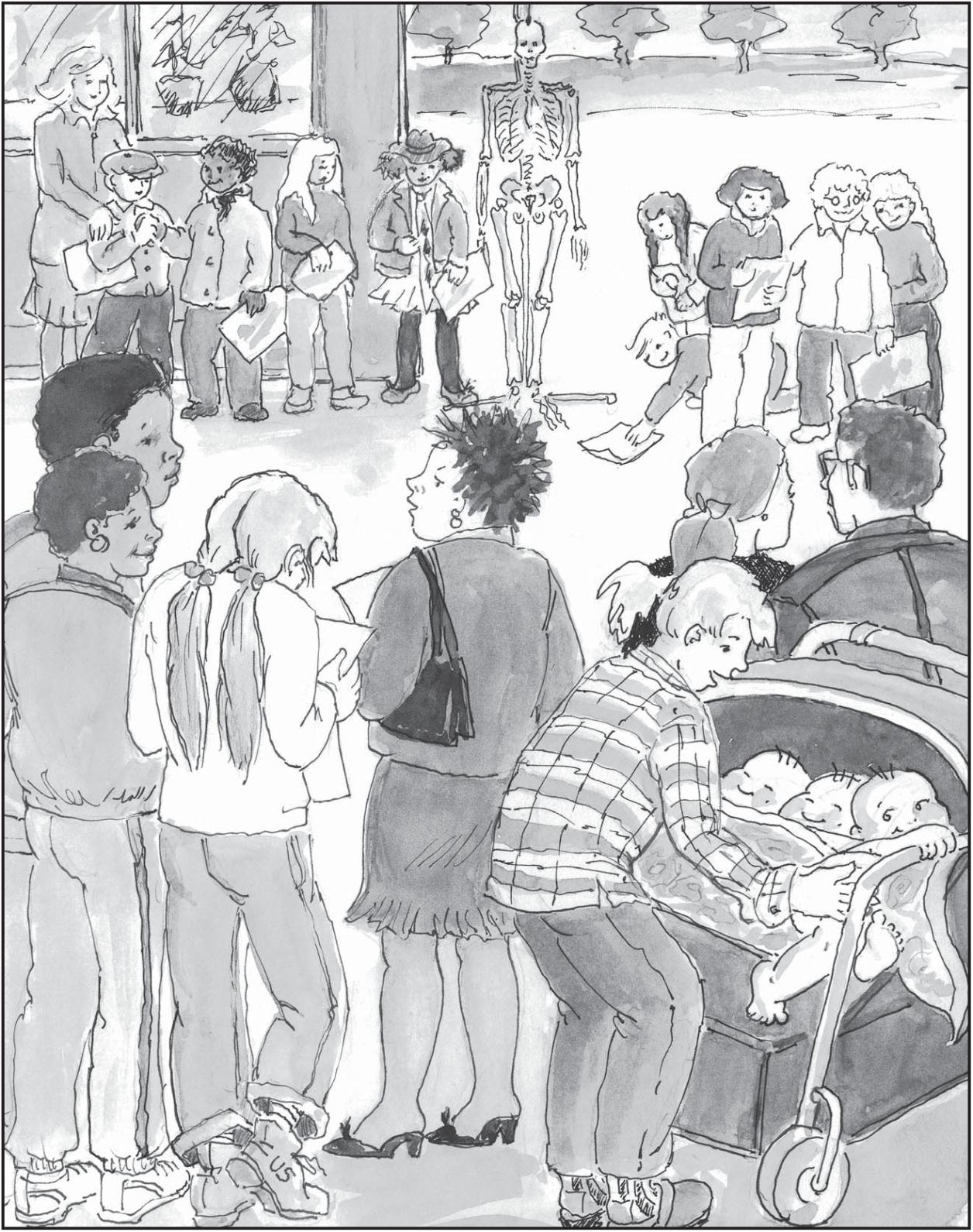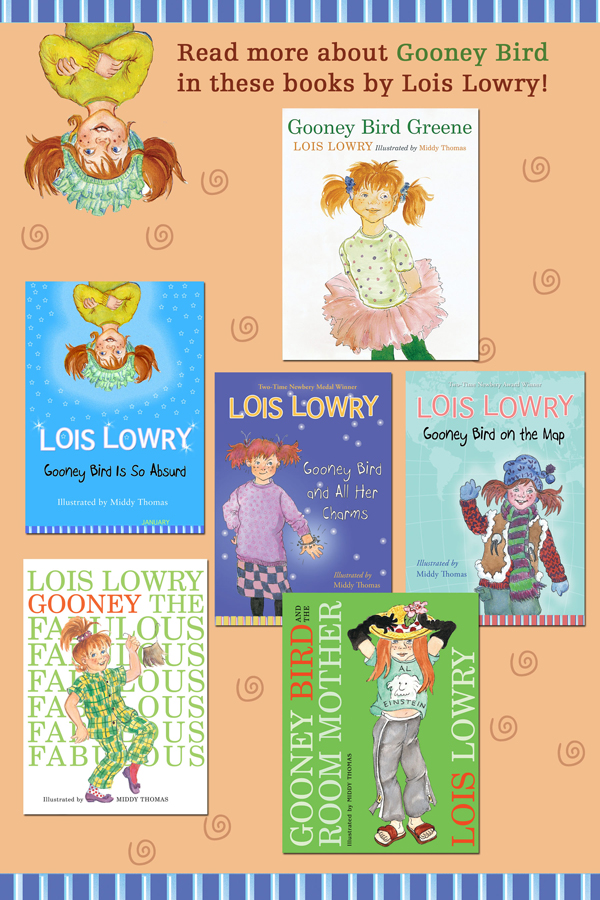Gooney Bird and All Her Charms (9 page)
Read Gooney Bird and All Her Charms Online
Authors: Lois Lowry

“I'll have to explain to Uncle Walter that Napoleon got Gooched,” Gooney Bird said. “It will wear off.”
“Is Dr. O. here yet?” Barry asked, looking around.
“No. But he will be,” Gooney Bird told him. “No one in my family is ever, ever late.
“Look! There are my parents, over there.” She waved. Her mom, who had long pigtails and was wearing army boots, waved back.
“Mine too!” said Chelsea.
“And my mom,” sighed Malcolm, “with the babies.” He waved to a woman standing beside a huge stroller.
Â

Â
“And mine!” Tyrone said, grinning at his mom and dad.
“There they be, standing by the fence,”
he chanted. “
The brothers and the sisters and the triplets and the 'rents!”
The second grade parents, who had been invited to Napoleon's final lesson and farewell, were all standing together at the edge of the playground, smiling.
Mr. Leroy, the principal, came down the front steps of the school. He greeted the parents.
“Ready, Gooney Bird?” he asked.
Today Gooney Bird was wearing a men's felt hat, the kind of hat that she said was called a fedora. “When I have a daughter someday,” she had once said, “I am thinking of naming her Fedora. It has a nice sound to it.”
Now she nodded. “Ready. I'll just pass these out to the parents.” She was holding a stack of papers that she had prepared that morning, in Mr. Leroy's office. Carefully she distributed them to the audience. Then she gave one to Mr. Furillo, who was standing with Bruno near the door.
“Where's Uncle Walter?” she asked her parents. “No one in our family is ever, ever late!”
“He's on his way,” Gooney Bird's father explained. “He called a few minutes ago. He had car trouble. He said to start without him.”
Mrs. Pidgeon began the ceremony. “This is Napoleon,” she said to the gathering of parents. “He has been visiting our school since the beginning of March, but today is his last day with us. Gooney Bird has given each of you a picture. Now she's going to explain what you are looking at.”
Gooney Bird went to the top of the steps and adjusted her hat. Her wrist jingled. “I am wearing my charm bracelet,” she told everyone. “I wear it on special occasions, like today. And this morning I used the copying machine in Mr. Leroy's office, and I copied my charm bracelet so that you could each see it up close. Take a look.”
The parents and Mr. Furillo all looked carefully at the papers they were holding. There was a picture of Gooney Bird's bracelet with all its small silver charms.
“We're going to use the charms to tell you about what we've been learning about the human body. Napoleon has been helping us. Chelsea is going first. Chelsea?”
Gooney Bird took off her fedora and placed it on Chelsea's head as she stepped forward.
“First charm is a skull,” Chelsea said in a loud voice. They had all practiced using outdoor voices. “Sometimes skulls look scary. But they shouldn't. This is Napoleon's head. And he is smiling. And also he took very good care of his teeth. Everybody? Smile like Napoleon!”
All of the children, and the parents, and Mr. Leroy, and Mr. Furillo, gave big smiles that showed their teeth. The only ones not smiling were Bruno, who was chewing on a stick, and the triplets, who were asleep in their stroller.
Chelsea removed the fedora and gave it to Ben, who came forward and put it on.
“Napoleon's skull is protecting his brain,” Ben explained. “If you look at the charm bracelet, you can see how when we took him to the library and learned about his brain, Napoleon sat in a rocking chair, wearing glasses and reading a book.”
All of the parents, looking at the pictures they were holding, smiled as they identified the chair, the spectacles, and the book.
“He was using his brain for all of that,” Ben pointed out. Then he bowed, and removed the fedora. “Malcolm? You're next,” he said.
Malcolm put on the fedora. “Next,” he announced, “find the lobster and the wineglass and the pizza slice.”
The parents all nodded, after they had located those charms on their pictures.
“We learned about digestion from Napoleon,” Malcolm continued. “We had to take away his wineglass because someone named Mrs. Gooch got all upset andâ”
Mrs. Pidgeon put her hand on Malcolm's shoulder. “I don't think we need to talk about Mrs. Gooch,” she murmured.
“Well, anyway, when Napoleon was drinking and eating the lobster and the pizza, everything got mixed with saliva and went down his esophagus, and then it churned around and turned into moosh in his stomach, and after that the moosh went into his intestines, and . . .”
“I think you can stop there, Malcolm,” Mrs. Pidgeon whispered.
“Can I say about the toilet?” Malcolm asked.
“No,” Mrs. Pidgeon said firmly. “Who's next?”
“Me!” Barry came forward and put the fedora on. “Next, after he ate, Napoleon went to the gym.”
“First he went to the bathroom,” Malcolm muttered.
Barry ignored Malcolm. He continued. “Look at the sneaker and the basketball. When he was in the gym, we all learned about Napoleon's muscles. His muscles make his bones move. Without muscles, we would just be like statues.”
Tricia put up her hand, suddenly. “Excuse me for interrupting,” she said. “But without
skin
, we would be a
blob
. Our skin holds all of our insides together. Isn't that right, Mom?”
She looked over at the parents. Tricia's mom waved and smiled. “That's right,” she said.
“My mom is a dermatologist,” Tricia explained.
“May I continue?” Barry asked in an irritated voice.
“Sorry,” Tricia said.
“Back to muscles,” Barry continued. “Muscles work in pairs.” He held up his arm.
“One muscles stretches it out, the other muscle pulls it back.” He demonstrated.
“Good job, Barry,” Mrs. Pidgeon said. “Who's next?”
“Wait,” Barry said, “I just want to say one more thing! It is okay to eat the other kind of mussels, because they are not spelled the same.”
“Me! I'm next!” Felicia Ann stepped forward and reached for the fedora. She put it on her own head. It was too big and slipped over her eyes, but Felicia Ann didn't mind.
“Big voice, Felicia Ann,” Mrs. Pidgeon reminded her.
Felicia Ann nodded, and the fedora slipped down farther over her face. She shouted, “The reason I'm able to shout is because of the air in my lungs! Napoleon's ribs protect his lungs because they are very important! All of his cells need oxygen, and they get it from his lungs!
“If you look at the charm bracelet, you'll see a pipe. If Napoleon smoked a pipe, it would damage his lungs! So don't do that! Or cigarettes, either!”
“That means you, Dad!” Nicholas said loudly.
His father, standing in the audience, looked guilty. “Got it, son,” he said. “I'm trying to quit.”
Felicia Ann lifted the fedora off. “You know what?” she said to the other second-graders. “When I can't
see
anything, I'm not so shy!” She grinned.
Gooney Bird replaced the fedora on her own head. “There are two more charms on the bracelet,” she announced. “The first one is a little heart. Nicholas and Beanie are going to pass around some hearts for you.”
Nicholas and Beanie, each carrying a small bag, distributed red cinnamon hearts to everyone. Mr. Furillo nodded okay when they got to Bruno, so Bruno got a cinnamon heart as well, but it made him sneeze.
“Napoleon's heart is there behind his ribs, between his lungs, and without it, Napoleon would be dead.
“Well, he is dead, actually. He's a skeleton. But you know what I mean. Our hearts are very, very important because they pump our blood around, and our blood carries oxygen to all our cells, and that's what keeps our organs working.
“And we make valentines shaped like hearts, and we say I HEART New York and other stuff, because some people think we feel love inside our hearts.
“Personally,” Gooney Bird continued, “I think we probably feel love in our brains and in our muscles and in our bones and in our stomachs. Maybe even our liver. But we didn't have time to study the liver.”
“Or pancreas,” Malcolm added.
“Or spleen,” said Barry.
“There is one more charm on the bracelet, and it's a Volkswagen Beetle. You can just ignore that one because it doesn't have anything to do with Napoleon,” Gooney Bird explained.
“You can come up one by one and shake Napoleon's hand if you want to, and tell him goodbye. We're going to miss him. But my Uncle Walter needs him back.”
“Just a minute!” Dr. Oglethorpe, wearing a suit and tie, suddenly came jogging up the walkway that led from the school parking lot. “Sorry I'm late!”
He introduced himself to all of the parents. “I'm out of breath from hurrying,” he said. “Huffing and puffing! But you already know about the lungs, right?”
Nicholas's father groaned. “I
said
I'm quitting!”
“I'm gonna bug you, Dad,” Nicholas said.
Dr. Oglethorpe turned to Napoleon and smiled as if he were greeting an old friend. Then he sniffed. “What . . . ?”
Gooney Bird explained quickly, in a low voice. “He got Gooched. It will wear off.”
“Gooched?”
Dr. Oglethorpe whispered.
“I'll explain later,” Gooney Bird whispered back.
Dr. Oglethorpe lifted Napoleon's right arm and bent the wrist back and forth so that Napoleon seemed to wave. “I imagine he'll be sorry to leave the school,” he said. “I bet he has had a lot of adventures here!”
The children nodded. “He read a book and ate and drank and played basketball and blew up balloons,” Barry said.
“And he got stolen,” Malcolm added.
“Stolen?”
Dr. Oglethorpe repeated. He looked down at the long bone in Napoleon's arm. “I find this humerus,” he said.
Everyone groaned.
“Okay,” Dr. Oglethorpe said. “I agree. Dumb joke. You know what is going to be humorous, though? Watching me drive away with Napoleon, because when my car broke down I had to borrow my neighbor's. We'll have to fold Napoleon carefully at his joints and he'll sit beside me in a tiny VW Beetle on the way home.”
“Ta-da!” Gooney Bird said, and jingled her charm bracelet.

Â
Visit
www.hmhbooks.com
to find all of the Gooney Bird books.

Â
L
OIS
L
OWRY
is known for her versatility and invention as a writer. She was born in Hawaii and grew up in New York, Pennsylvania, and Japan. After several years at Brown University, she turned to her family and to writing. She is the author of more than thirty books for young adults, including the popular Anastasia Krupnik series. She has received countless honors, among them the Boston GlobeâHorn Book Award, the Dorothy Canfield Fisher Award, the California Young Reader's Medal, and the Mark Twain Award. She received Newbery Medals for two of her novels,
Number the Stars
and
The Giver
. Her first novel,
A Summer to Die
, was awarded the International Reading Association's Children's Book Award. Ms. Lowry now divides her time between Cambridge and an 1840s farmhouse in Maine. To learn more about Lois Lowry, see her website at
www.loislowry.com
.
